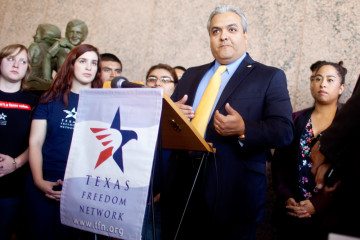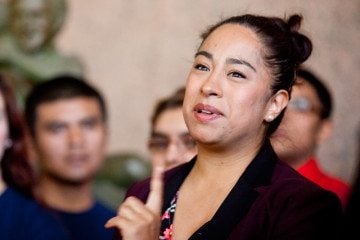 |
| Patrick Michels |
I myself covered this in an earlier piece, too, on my blog in this April 4, 2014 post: The Earth Shifted A Bit This Last Week Here In Austin and Texas.
Tony Diaz with librotraficantes and the NACCS Tejas Foco statewide organization of scholars, graduate students, and undergraduates, and now together with LULAC, the GI Forum, the TFN and MALDEF and so many others, the circle has grown much wider. Individually and collectively, this has been a protracted struggle for inclusion that of course surface, but things are changing. I have not seen such unity in a long time.
Also, if you haven’t already done so, be sure to sign the petition, as well: http://masfortexas.org/
It's so very important to know this recent history and how things have evolved in order to not only know the lay of the land, but to be able to also know when shifts occur or are occurring and why.
Angela

Instead of a new course in Mexican-American history, which the board was expected to debate, they approved a plan to ask publishers for new textbooks on the subject, along with other ethnic histories.
Yesterday’s outpouring of support for a new Mexican-American history elective was prompted by Brownsville Democrat Ruben Cortez’s decision last fall to add the course to a “wish list” for new state standards. Heading into today’s meeting, the board was expected to vote on whether to create the new course and ask Texas Education Agency staff to begin the work of drafting new state standards—known, in the parlance of the state bureaucracy, as TEKS—in Mexican-American history.
Some board members had already said they doubted whether Mexican-American history needed its own course. San Antonio Republican Ken Mercer wondered yesterday whether the course would include his two favorite U.S. senators, Ted Cruz and Marco Rubio (both of whom are Cuban-American). He was joking—one hopes—but the drawn-out process of creating the new course would have invited another round of the sort of hyper-partisan revisionist history that made the State Board of Education famous.
Instead, Cortez proposed using a vaguely defined elective course that already exists, called Special Topics in Social Studies, and asking publishers to submit textbooks on Mexican-American studies to use in the course—along with textbooks on African-American, Asian-American and Native American histories too.
Yesterday, Texas Freedom Network president Kathy Miller said she hoped the Mexican-American studies course would encourage the board to embrace other ethnic studies in public schools, and Cortez’s proposal did that. (Miller also mentioned women’s studies, which did not get included in Cortez’s amendment.)
After a very brief debate, the board approved Cortez’s proposal 11-3:
Republicans Pat Hardy, Tincy Miller and David Bradley voted against it. Board chairwoman Barbara Cargill abstained.
The move means no new high school course in Mexican-American history but to activists like Houston author Tony Diaz, who championed the recent #SupportMAS cause, the vote was still a win.
After the meeting, Cortez told the Observer that having a state-approved textbook on Mexican-American history would be a huge help to districts that want to teach the subject.
“The most difficult part that our districts have in this state is identifying the instructional materials to be taught for this course,” he said. “So did we create a new course? Did we create new TEKS? No. But as you know, our social studies books have very limited real estate. So they can only teach you about a certain limited number of individuals in history. By doing this, we’ve in essence created four new textbooks.”
Today’s vote was only preliminary; the board will take a final vote on Friday. Assuming his proposal passes then, Cortez hopes to tweak the Special Topics in Social Studies course when the board reconvenes in July. He’d like to see it become a one-credit course rather than a half-credit course, and add language to the course description that suggests a focus on Mexican-American and other ethnic studies.
For now, the textbook proposal dodged a nasty fight over just whose history U.S. and Texas kids should learn about in school. As Cortez diplomatically put today, “I’m just glad this didn’t get over-politicized in the board room.”
Outside the boardroom, things got nastier. This morning, conservative education writer Donna Garner blasted out a call to action asking her readers to call board members and oppose the “discriminatory” Mexican-American history course, as did North Texas activist Alice Linahan’s Women on the Wall.
Dave Mundy, a Republican running for a South Texas state board seat, warned on Facebook that “our state’s public education system is about to be taken over by the most vile of racist radicals masquerading as academics because WE did not stand up and fight them.” Mundy described the scene Tuesday as “a pep rally complete with a busload of college radicals waving Che Guevara-like signs.”

Patrick Michels
“We’re making great strides in the right direction. I’m definitely excited and anxious about where this is going to take us,” she said. “Had we been approached in the same way for Native American studies or African-American studies, that push would have gone the same way.”
El Paso Democrat Martha Dominguez said she hopes the course becomes a way for Texas’ schools to reach out to students from even more cultures. “It does give recognition to not only the Mexican Americans, Asians and Native Americans, but it’s gonna pave the way for others that are here that we haven’t heard about,” she said.
“What we did today is even better than saying, ‘Let’s have a Mexican-American studies course’,” Cortez said. “And on the 50th anniversary of the Civil Rights Act, what better way for us to end our day?”
Staff writer Patrick Michels covers school reform and crime for the Observer.
#RejectTheTexas
No comments:
Post a Comment